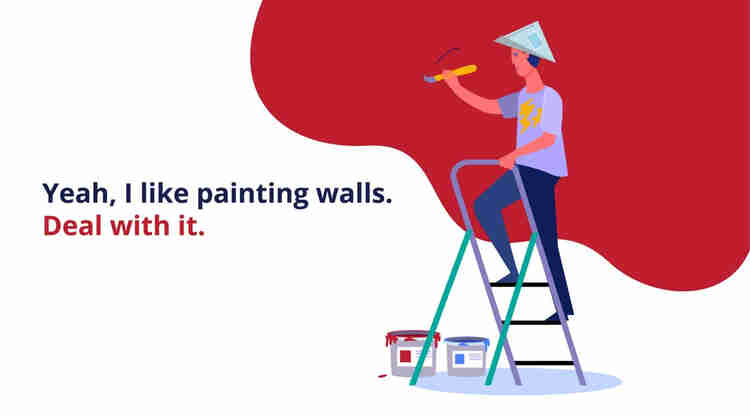Be Your Own PR Guru And Define Your Personal Brand
- By Nikhil Nagarkar
- 24 Jul 2021
Be Your Own PR Guru And Define Your Personal Brand
“Life isn’t about finding yourself. Life is about creating yourself” -George Bernard Shaw
You know that buzzword you keep hearing — Personal Brand? No one’s got a shotgun to your head telling you to make one. But in the age of information, if you fail to manage your personal brand it can lead to misinformation about you. Defining yourself will ensure that the public sees the image that you want them to see.
Personal branding is a journey of discovery. While puffing up your chest and flashing that look of confidence (or faux confidence, whatever works) is a great start, there’s an ember of genuine value that you can fan to a flame.
This is an opportunity for you to explore that fire and see where it takes you. The following points will help you define and create an image that is genuinely
Think Of Your Brand Mantra

You know what makes you feel alive.
Brand mantras are short and powerful. Explore what makes your brand unique along with what you represent. In order to create a brand mantra, you must first identify what sets your brand apart. Start by listing your KSPs (Key Selling Points — industry jargon for what something or someone brings to the table). There is no “ideal” mantra, but a powerful one would showcase these qualities:
– It’s short and simple.
– Communicates what is unique about your brand.
– Inspires others.
When creating a mantra, it’s good to list down everything you can offer and how that relates to your purpose and mission.
Here are some examples from brands you might have heard of:
1. Nike: Authentic Athletic Performance
Nike’s got a bit of a reputation for motivation. This mantra was created by Scott Bedbury, Nike’s global head of advertising in the 1980s. Everything the company does stems from its mission to inspire and motivate every athlete in the world. It does a fine job of amping up its employees too.
2. Disney: Fun Family Entertainment
Another mantra from the 80’s is from the land of magic itself. You might be wondering why the word magic didn’t make the mantra cut. Well, you and I both. But what they came up with does capture the essence of what the brand is and how people relate to it.
3. Ritz-Carlton: Impeccable Hospitality
Ah, the Ritz. If the name doesn’t bring a glimmer to your eye, maybe its mantra will. You just hear it and think “yeah. That’s what I want.” And that’s what you’ll get. That’s if they hold up their end of the bargain.
4. BMW: Ultimate Driving Machine
Not A driving machine. Not THE driving machine. They’re the Ultimate Driving Machine. No one can touch them. Sure, it’s audacious but hey — that’s what they’re promising and people love what they produce.
5. Harley Davidson: Personal Freedom
It’s just you and Harley against the wind. I’ve imagined riding one of these bikes and it’s the same vision every time. The great pacific highway. Top speeds. Huge beard. Freedom. An orange sunset would be great too.
See how a few words can capture the essence of something? Next —
Be As Authentic As You Can

Ha, he got caught.
People are attracted to the genuine. The key to personal branding is to make it personal. There are plenty of dry facts online that will not impress most people, which is why your brand needs a personality.
Quirks, traits, whatever your weird or cool is — that’s attractive.
When you‘re developing your persona, ask yourself “does this feel real?” if not. Keep looking. Keep trying. It’s a process of self-discovery.
I’ve heard many people say feel the need to fit the mold of what the world wants, instead of being who they are. I don’t blame them. When I was in high school, we were told universities could reject us for a distant beer can that wandered into an otherwise innocent Facebook photo. While this is an exaggeration, the persistent notion of judgment is what holds people back from exploring their digital personalities and developing their personal brands.
I’ve heard many people say feel the need to fit the mold of what the world wants, instead of being who they are. I don’t blame them. When I was in high school, we were told universities could reject us for a distant beer can that wandered into an otherwise innocent Facebook photo. While this is an exaggeration, the persistent notion of judgment is what holds people back from exploring their digital personalities and developing their personal brands.
In branding, your pillars are your main values. They are the attributes that help define your identity. Ask yourself “what’s important to me… what do I stand for?” and make a list of ideas. Then, choose the main values and link them to what your brand has to offer. It’s best to begin branding with one or two pillars. You can always expand in the future.
Identify Your Passions

Power to you. Whatever you’re into is a valuable skill.
Your brand should reflect your passions. Ask yourself the following questions to identify them:
• What do you care about?
• What drives you?
• What do you consider your passions?
Remember to list all of them, not just the ones that are obviously related to work.
People know that there’s more to you than your work.
Your brand can personalize you to other people, so a passion for art, family, or the environment could only contribute to your brand. You are bound to attract people with similar likes and you can always find ways to incorporate your passions into your work. Get creative!
Define Your Strengths
Branding requires you to identify your strengths. It is important that you do not overlook any of them because it’s easy to get distracted by desired attributes. Making this mistake can be disastrous and keep you from realizing your potential. Imagine being stuck in an “‘I’m not good enough” loop. I’ve been there. I still go there at times. That’s why it was important for me to give myself credit and recognize my strengths.
Some helpful ways to maneuver these thoughts — What comes easily to you? What do you do better than other people? It doesn’t matter how insignificant it may seem. Jot it down and let it simmer in your head.
Also, consider aspects of your character that are natural strengths. For example, self-control, trustworthiness, and intelligence are all strengths that define you and your brand.
The Three Cs Clarity, Consistency, and Constancy. Whether you are creating a personal or business brand, you will find the three Cs extremely useful.
Clarity: Your brand needs to be clear about what you do and do not represent. If there is any ambiguity in your branding, it’ll lead to confusion.
Consistency: Once you have clearly established your brand identity, it is important that you remain consistent. Consistency requires that you present yourself in the same light each time you communicate your brand. This consistency needs to be in your stated values and made visible in your actions.
Constancy: Your brand requires constancy, meaning that it is visibly dependable. Once you define your brand, commit to it. If you’re on a mission to save the world, tigers, turtles, whatever —do it and bring people on the ride. If you want to make people laugh, dance, cry… what you create will do that and people are depending on you for it.
Remember If You Don’t, They Will
It’s easy to underestimate the importance of personal branding and avoid actively participating in your brand, or “being on the court”. The truth, however, is that branding occurs whether you participate in it or not.
If you do not take the time to brand yourself, the market will brand you, and it may not do so favorably.
You are in control of your personal brand if you choose to be. When establishing your brand, it is essential that you define yourself. Remember that perception is reality, so it is essential that you carefully cultivate your image. When you take the time to define yourself and present this definition to the public, you will reap the benefits that come with taking control of your personal branding.

Just get started and keep going.

